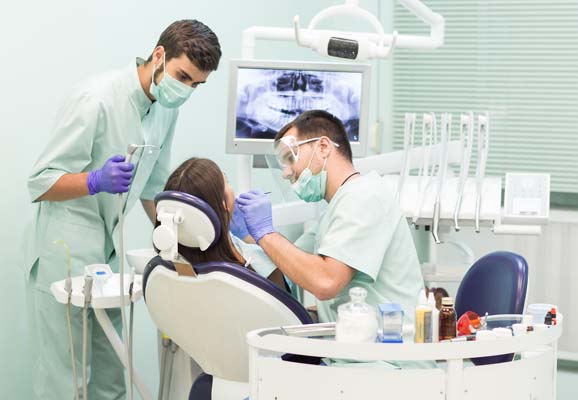Reasons an Oral Surgeon Would Perform a Gum Graft

A gum graft from an oral surgeon can improve the appearance and health of your smile. Gum recession is a common oral health problem where the gums pull back from the teeth, making them look elongated. This is not just a cosmetic issue. Gum recession can make the tooth roots and underlying structures that support teeth more vulnerable to decay and the negative effects of gum disease.
Gum recession can happen to anyone. It is often the result of poor oral hygiene or gum disease. However, brushing too hard can also cause gums to recede. For genetic or other reasons, gum recession sometimes occurs despite a person's best efforts. Regardless of the cause, a gum graft can restore volume to the gum line, protecting your smile's health.
What is a gum graft?
There are a few different forms of this procedure. However, the oral surgeon typically takes tissue from another part of the patient's mouth and stitches it into the area where it is needed. The procedure is done under local anesthesia, and the recovery period usually takes about a week or two. However, recovery time can vary based on the extent of the procedure.
Benefits of the gum graft procedure
Though most people would prefer to avoid oral surgery if a gum graft is needed, its benefits usually far outweigh any discomfort. A gum graft can deliver the following results:
Improves the smile's appearance
When gums recede, teeth can look unnaturally long. Though the main purpose of a gum graft is usually related to oral health needs, the patient may appreciate what the procedure does for their appearance. In addition, a gum graft can bring the aesthetics of the teeth and gums back into balance.
Less sensitivity
When gums recede and the tooth roots are exposed, patients can first notice sensitivity to hot and cold. This discomfort can be especially troublesome when eating or drinking. A gum graft covers the exposed roots limiting or eliminating this sensitivity.
More protection against tooth decay
Gums help protect the teeth against tooth decay, and a gum graft helps to restore this protection. However, gum recession exposes more of the tooth to decay, especially the root. This exposure can make a patient more likely to develop tooth infections that spread and lead to tooth loss and other oral health problems.
Guard against bone loss from periodontal disease
As gums recede untreated, the bone and underlying structures are at increased risk of damage from gum disease. Bone loss can occur, leading to tooth loss, among other oral health problems. A gum graft is one of the leading treatments for gum disease that helps to protect the structures that support teeth so patients can keep their smile intact and healthy for a lifetime.
Protect your smile with a gum graft
If you are one of the many struggling with some form of gum disease, gum recession is a key concern. If your teeth are starting to feel more sensitive or too much of the teeth are exposed, gum recession may be the cause and will require treatment. However, a gum graft can restore your gum line to help protect your teeth and preserve the look of your smile. Call our office today to learn more about the procedure. Our team is happy to help.
Request an appointment here at https://spectrumsurgical.net or call Facial Spectrum at (816) 524-4334 for an appointment in our Lee's Summit office.
Check out what others are saying about our services on Yelp: Read our Yelp reviews.
Recent Posts
The jawbone is the part of the face that holds many essential elements together, such as the teeth, ligaments, and muscles; however, bone grafting may sometimes be necessary if the jawbone is too weak to perform these tasks. A person’s jawbone can deteriorate over time, whether due to age, genetics, poor oral health, cancer, or…
Finding lasting relief from issues such as misalignment and facial asymmetry can involve specialized procedures. Fortunately, corrective jaw surgery is a reliable option for addressing these concerns. A dental specialist realigns the upper or lower jaw during this process to promote better function and comfort. Although the procedure can benefit health and appearance significantly, a…
Many individuals seek rhinoplasty to enhance facial harmony, improve nasal function, or correct structural abnormalities. As a surgical procedure that reshapes the nose, rhinoplasty can address aesthetic concerns as well as breathing difficulties caused by structural defects such as a deviated septum. Understanding the consultation process, surgical techniques, and what to expect from the recovery…
The facelift is one of the oldest and most well-known cosmetic surgeries for restoring a youthful appearance to the face. If you are considering this procedure, it is important to understand the steps of the process and the time commitment involved. The specifics of the process can vary depending on the patient; however, here is…


